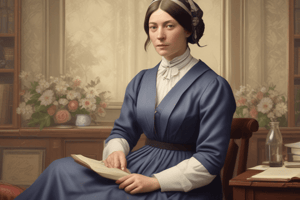Podcast
Questions and Answers
What is the primary factor that influences a person's beliefs about human needs, health, and illness?
What is the primary factor that influences a person's beliefs about human needs, health, and illness?
- Altruism
- Person's values (correct)
- Autonomy
- Integrity
Which behavior from the list is NOT identified as one of the 52 Professional Behaviors of the Nurse mentioned in the text?
Which behavior from the list is NOT identified as one of the 52 Professional Behaviors of the Nurse mentioned in the text?
- Human Dignity
- Autonomy
- Altruism
- Resilience (correct)
Where does the ability to be ethical begin and how does it develop?
Where does the ability to be ethical begin and how does it develop?
- It begins with adulthood and develops rapidly
- It begins in infancy and develops suddenly
- It begins in adolescence and develops in spurts
- It begins in childhood and develops gradually (correct)
What is NOT included in the 'Nurse Job Description' from 1887 mentioned in the text?
What is NOT included in the 'Nurse Job Description' from 1887 mentioned in the text?
Which concept is NOT listed as a 'Nursing Image' mentioned in the text?
Which concept is NOT listed as a 'Nursing Image' mentioned in the text?
What is the relevance of understanding a person's values according to the text?
What is the relevance of understanding a person's values according to the text?
What is the significance of 'Integrity' as one of the 52 Professional Behaviors of the Nurse?
What is the significance of 'Integrity' as one of the 52 Professional Behaviors of the Nurse?
Which African-American nurse was appointed matron of a hospital at Fort Monroe in Virginia during the Civil War?
Which African-American nurse was appointed matron of a hospital at Fort Monroe in Virginia during the Civil War?
Who founded the National Association of Colored Graduate Nurses to assist nurses of color in entering the profession?
Who founded the National Association of Colored Graduate Nurses to assist nurses of color in entering the profession?
Which nurse served as the superintendent of Female Nurses of the Army during the Civil War and founded the first Public Mental Health Hospital in America?
Which nurse served as the superintendent of Female Nurses of the Army during the Civil War and founded the first Public Mental Health Hospital in America?
Who was known as the 'angel of the battlefield' during the Civil War and established the Red Cross in the US?
Who was known as the 'angel of the battlefield' during the Civil War and established the Red Cross in the US?
Who established nursing training programs in the United States and Japan, and created the first system for keeping individual medical records for hospitalized patients?
Who established nursing training programs in the United States and Japan, and created the first system for keeping individual medical records for hospitalized patients?
Who was recognized as the first professionally trained nurse in the US?
Who was recognized as the first professionally trained nurse in the US?
Which individual became a nurse to care for wounded soldiers during the Civil War?
Which individual became a nurse to care for wounded soldiers during the Civil War?
Who was known for contributions to human rights, was the founder of American Community Nursing, and established Public Health Nursing?
Who was known for contributions to human rights, was the founder of American Community Nursing, and established Public Health Nursing?
Which founder worked diligently to promote the use of birth control and formed the World Population Conference in 1927?
Which founder worked diligently to promote the use of birth control and formed the World Population Conference in 1927?
Who started the first nursing program in a major university at John Hopkins Hospital and enrolled in the inaugural class?
Who started the first nursing program in a major university at John Hopkins Hospital and enrolled in the inaugural class?
Who was the first nursing professor in a major university?
Who was the first nursing professor in a major university?
Which nursing leader was instrumental in the constitutional amendment giving women the right to vote?
Which nursing leader was instrumental in the constitutional amendment giving women the right to vote?
Who established one of the first midwifery schools in the US?
Who established one of the first midwifery schools in the US?
Which organization represents over 28 million nurses worldwide?
Which organization represents over 28 million nurses worldwide?
Which organization promotes BSN as entry-level education?
Which organization promotes BSN as entry-level education?
What was one of Florence Nightingale's contributions to modern nursing?
What was one of Florence Nightingale's contributions to modern nursing?
What is a key focus of the International Council of Nurses, World Health Organization, and Nursing Now Campaign in achieving Universal Health Coverage?
What is a key focus of the International Council of Nurses, World Health Organization, and Nursing Now Campaign in achieving Universal Health Coverage?
What significant role did Harriet Tubman play during the Civil War?
What significant role did Harriet Tubman play during the Civil War?
In what aspect did Florence Nightingale distinguish nursing from medicine?
In what aspect did Florence Nightingale distinguish nursing from medicine?
What did Florence Nightingale stress the need for in nursing?
What did Florence Nightingale stress the need for in nursing?
Flashcards are hidden until you start studying
Study Notes
Theory of Animism
- In ancient Greece, temples became centers of medical care, and illness was believed to be caused by sin and god's displeasure.
- Nurses cared for people in the home and community.
- Ancient Greeks and Hebrews developed the Ten Commandments and Mosaic Health Code, which addressed human relationships, mental health, and disease control.
Influential Nurses in History
- Sojourner Truth (1864): Provided care to soldiers during the Civil War, advocated for abolition, temperance, and civil and women's rights, and met with President Abraham Lincoln in 1864.
- Dorothea Dix (1836): Served as superintendent of Female Nurses of the Army during the Civil War, recruited nurses, and fought to reform treatment for mental illness; founded the first Public Mental Health Hospital in America.
- Clara Barton (1882): Known as the "angel of the battlefield" during the Civil War, tended to wounds, and fed injured Union soldiers; assigned special duties by President Lincoln; helped the International Red Cross during the Franco-Prussian war; and established the Red Cross in the US.
- Linda Richards (1874): First professionally trained nurse in the US; established nursing training programs in the US and Japan; created the first system for keeping individual medical records for hospitalized patients; introduced MD orders and nurse's notes.
- Harriet Tubman (1862): Provided care and safety to slaves on the underground railroad during the Civil War; first nursing program in a higher education university; introduced clinicals along with a formal curriculum.
- Mary Mahoney (1879): First African-American professional registered nurse; worked to provide good service to all patients; co-founded the National Association of Colored Graduate Nurses to help other nurses of color get into the profession.
- Mary Breckenridge (1924): Established one of the first midwifery schools in the US; drove healthcare in rural communities.
- Lavinia Dock: Nurse leader, women's right activist; instrumental in the constitutional amendment giving women the right to vote; historian who believed nursing would not be accepted as a profession until its history is soundly documented.
- Florence Nightingale (1860): Recognized that nutrition is important to health; instituted occupational and recreational therapy for sick people; stressed the need for continuing education for nurses; maintained accurate records, recognized as the beginnings of nursing research; implemented sanitation practices; reduced mortality from 42% to 2%.
Theory and Models in Nursing
- Theory of Animism: Believed that illness was caused by sin and god's displeasure.
- General Systems Theory: Used for universal applications; describes how to break whole things into parts and then learn how the parts work together in systems.
- Adaptation Theory: Describes the adjustment of living matter to other living things and environmental conditions; a continuous process of interaction and response.
- Developmental Theory: Describes the growth and development of humans as orderly and predictable, beginning with conception and ending with death; ability to be ethical begins in childhood and develops gradually.
Professional Behaviors of the Nurse
- Altruism: Putting the needs of others before one's own needs.
- Autonomy: Having the freedom to make decisions and act based on those decisions.
- Integrity: Being honest and morally upright.
- Human Dignity: Respecting the worth and dignity of every human being.
- Social Justice: Promoting fairness and equality for all individuals.
Nursing Image and Job Description
- Nursing Image: Perceptions and myths about nursing, including contemporary nursing images (positive and negative).
- Nurse Job Description (1887): Daily responsibilities included sweeping and mopping floors, dusting patient furniture and windowsills, maintaining an even temperature, and reporting to work at 7 am and leaving at 8 pm, except on the Sabbath.
Studying That Suits You
Use AI to generate personalized quizzes and flashcards to suit your learning preferences.




